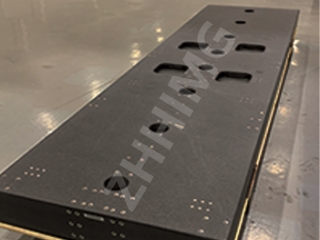The bridge coordinate measuring machine (CMM) is widely considered to be one of the most precise measurement tools available in the industry. The accuracy of this tool depends on several key factors, such as the quality of the measuring probes and the control software. One crucial factor that can greatly affect the CMM's measuring range and accuracy is the choice of the bed/body material.
Traditionally, bridge CMMs were constructed using cast iron, a material with excellent rigidity and stability. However, in recent years, granite has become a popular alternative. Many manufacturers now prefer granite due to its superior mechanical properties and thermal stability.
Unlike cast iron, granite has a much lower coefficient of thermal expansion, making it less susceptible to thermal deformation caused by temperature fluctuations. This thermal stability allows the CMM to maintain its precision over a wide range of operating temperatures, ensuring that measurements are accurate and consistent.
Another advantage of using granite for the CMM bed is its natural damping properties. Granite has a higher damping capacity compared to cast iron, which helps to minimize the effect of machine vibrations caused by handling or environmental factors. By reducing these vibrations, the granite bed ensures that the measuring probes can achieve a more stable and accurate reading, minimizing errors and reducing the need for calibration.
Moreover, granite is much less prone to wear and tear compared to cast iron. Over time, the surface of a cast iron bed may become dented or scratched, leading to inaccuracies in the measuring process. Granite, on the other hand, is highly resistant to such damage, ensuring that the machine's accuracy remains consistent throughout its operational life cycle.
Another significant advantage of granite is its ability to handle heavier loads. With its high compressive strength and excellent rigidity, it is capable of withstanding heavier workpieces without compromising its precision.
In conclusion, the granite bed is an essential component of a modern bridge CMM, providing several benefits over traditional materials like cast iron. It offers superior thermal stability, damping, and wear-resistant properties, ensuring that the machine can maintain its accuracy and consistency over the long term. In addition, its ability to handle heavier loads makes it a more versatile tool for measuring larger workpieces accurately. Overall, the use of granite is undoubtedly a positive development in the development of bridge CMMs, one that will continue to improve the accuracy and reliability of these tools for years to come.
Post time: Apr-17-2024

